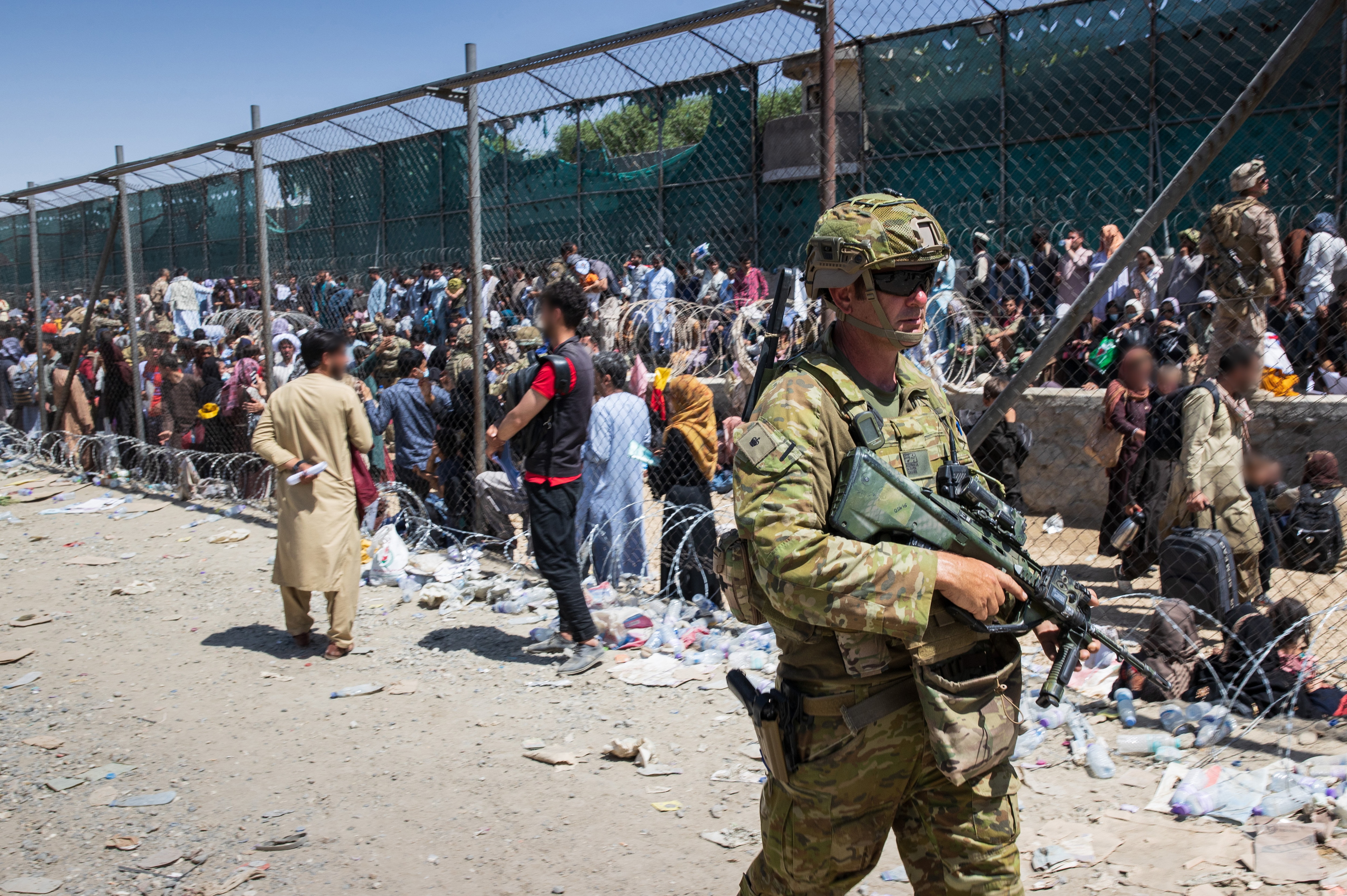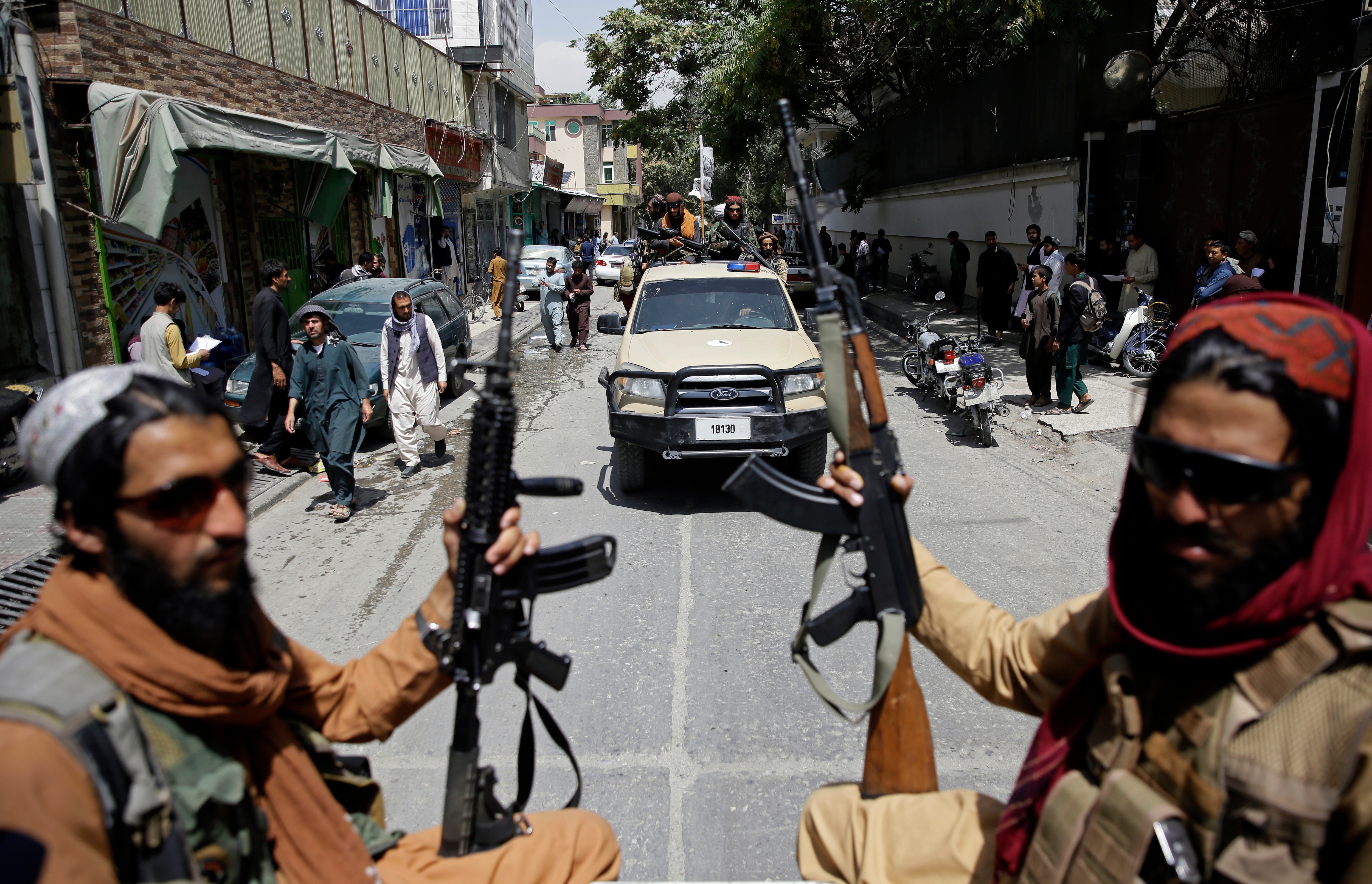What will happen to them Anxious Australians worried for loved ones left behind in Afghanistan
His voice filled with anxiety, Mustafa* is asking questions for which he fears there are no answers.
"What about our loved ones stuck there?" the North Queensland resident tells SBS News.
“I don’t know what’s going to happen.â€
Like dozens of those in Australia with immediate family and loved ones left behind in Afghanistan, Mustafa is now contemplating how to get his fiancée out of the country now that Australia's military evacuation flights from Kabul have ceased.
His fiancée was at Kabul airport trying to reach evacuation flights on Thursday evening (local time), when twin suicide bombs detonated just metres away from her, killing more than 150 and wounding many more.
Hours earlier, Australian soldiers were preparing to leave the country after wrapping up Australia's nine-day rescue mission.
"What are we gonna do? What am I gonna do?" Mustafa asks in desperation.
"What's going to happen to my fiancée? What is going to happen to the lives of those family members of Australian permanent residents and citizens?â€
He says he has one message to the government: "Will you help us?"
Options are limitedIt is not known how many citizens and visa holders remain in Afghanistan. The federal government has not given a firm figure, but has indicated the number is increasing as people continue to register their presence in the country with the Department of Foreign Affairs.
Australia has evacuated over 4,000 people since the rescue mission began on 17 August.
But for those left behind - ranging in their dozens - their options appear limited.
"Our concern is that now for Afghans who are in the country, they either have to shelter in place and wait for civilian flights to resume - and we don't know when that will be - or potentially they have to look at how they can make their way to land borders," Human Rights Watch Australia's Elaine Pearson told SBS News.
The US evacuation flights ‘restricted’The US has just days until the Taliban's deadline of 31 August for foreign forces to leave the country.
For now, it is still operating evacuation flights but the security situation at the airport and the need to draw down its presence and personnel will mean it will be difficult - albeit not impossible - for Australians and Australia visa holders to hitch a ride on those flights.
Prime Minister Scott Morrison has said the ability of Australians to get on the US rescue mission will be restricted, given their focus will be on the withdrawal of its forces in the coming days.
The UK has also ceased evacuation flights, further limiting the options for Australians.
Can they leave on commercial flights?Many people are looking forward to commercial flights to leave the country but that option also appears precarious.
There are a lot of questions about who will run the airport after the US leaves, or even if airlines will continue to fly into an airport that is run by the Taliban from September 1.
The US has conceded it will be unlikely that commercial flights will resume immediately after it leaves.

A supplied image obtained on on Friday, August 27, 2021, shows Major Tim Glover, part of the 1st Battalion, Royal Australian Regiment.
DEPARTMENT OF DEFENCE
"Running an airport is not an uncomplicated piece of business," US State Department spokesman Ned Price said on Friday.
"I think that it is probably unreasonable to expect that there will be normal airport operations on September 1."
NATO has been running air traffic control, fuel supplies and communications, while military contingents from Turkey, the United States, Britain and Azerbaijan have been in charge of security.
Leaving Kabul with a heavy heart. My gratitude to all #NATO Allies & Partners for a massive evacuation effort from #Afghanistan despite all challenges. NATO played a key role in getting thousands out and is committed to getting others to safety. 🙠to #Italy 🇮🇹 for flying us out. pic.twitter.com/NcWH3z20hE
â€" Stefano Pontecorvo (@pontecorvoste) August 27, 2021But William Maley, an expert on Afghanistan at the Australian National University, says NATO civilian personnel will have to leave as well.
"By Wednesday, they’ll all be gone," he told SBS News.
"It's very much an open question whether the airport will continue to operate at all."
Turkey could play a part in airport logistics, but the Taliban has indicated it wants to run security.
That is a prospect that has irked many officials, who say there won't be many airlines that will agree to fly into Kabul as long as the Taliban are unable to offer real assurances on security and that the infrastructure is in good working order.
There is also the question of whether insurers will want to back airlines flying into an insecure airport.
"They would want to be very confident that they wouldn't risk having to pay out the cost of losing a major airliner by virtue of the insecurity in the environment of the airport," Professor Maley says.
"So I don't think those Australians who are caught (there) at the moment are really in a position to expect the rapid resumption of commercial flights."
Can they make their way to nearby countries and leave from there?Another option being floated is to have Australians and visa holders travel through land borders to cross into countries where commercial flights to Australia are still operating.
Ms Pearson says the Australian government should be imploring Afghanistan's neighbouring states like Pakistan and Iran to keep their borders open.
"And it should be offering more support to those governments who are already hosting huge numbers of Afghans who are displaced and, you know, in the coming days and weeks are likely to be hosting many, many more who play across the border," she told SBS News.

Pakistani soldiers check documents of people before crossing into Afghanistan at Chaman border point point, in Pakistan, 27 August 2021.
EPA
Professor Maley says land border crossings will be a risky and perilous journey for many.
"The difficulty of moving from Kabul to other parts of Afghanistan at the moment is pretty high because of the possibility that travellers will encounter angry bands of undisciplined Taliban (fighters) at various points along the way," he said.
"There's always the possibility that neighbouring states would also wish to close their borders to people coming from Afghanistan, and that could create a very dangerous situation again.
"So there are a lot of problems confronting people who are still within Afghanistan, even if they have a legal right to enter Australia."
How will the Taliban treat Australians and visa holders?There are also conflicting reports about what Taliban officials have promised to do when foreign forces leave, and how it will treat foreign nationals and Afghans with visas.
Taliban officials have said it will allow Afghans with valid documents to travel at any time, but they have also said it would encourage people to stay and rebuild their country.
SBS News has spoken to many visa holders who say they are concerned they will not be allowed to leave the country once it is under the complete control of the Taliban.

Taliban fighters patrol Kabul, Afghanistan, Thursday, Aug. 19, 2021.
AP
They are also worried about rumours that Taliban fighters have been demanding bribes in return for allowing Afghans passage through the airport.
Human Rights Watch says many people are at risk of retaliatory attacks.
"I have spoken to Australian Afghans here who have told me their family members are taking shelter in the basement," Ms Pearson said.
"They are very worried about any knock at the door because it could be the Taliban because they had family members who worked for the previous Afghan government."
An Australian resident with several family members who remain in Kabul, including his wife and children, is concerned for their safety.
The family is part of the ethnic Hazara minority group, which has long faced persecution at the hands of the Taliban.
He is pleading with the government to help bring his family to Australia.
"I am scared, maybe someone report (them) to the Taliban, (and tell them) this father is living in Australia," he told SBS News from his home in the NSW Upper Hunter region.
Visas are due to expireIn addition to Australian citizens, there are more than 150 Afghans - including former interpreters who have worked with Australian Defence Forces and staff of Australia's former Kabul embassy - who failed to get on the evacuation flights from Kabul.
Despite four failed attempts - including several days wading through sewage in a bid to be recognised by soldiers to board the rescue flights - around 147 embassy guards are now in hiding in Kabul.
Both cohorts - interpreters and embassy staff - have been issued temporary visas that expire in three months.
That leaves a deadline for them to leave the country, without a firm means to do so.
Home Affairs Minister Karen Andrews on Saturday said extending those temporary visas, "can and will be looked at over time".
What has the Australian government said it will do?Ms Andrews also said Australia had moved "heaven and earth" to get people out of Afghanistan.
She said that the government would continue to do "absolutely everything" it could to get those remaining back to Australia, and many options are being considered.
"We’ll continue to talk with many other nations, particularly those that are in the immediate vicinity of Afghanistan," she said.
"We're also looking at access to refugee camps to see how we can access people who are already there, and people who might be able to get to a refugee camp."
- With AFP and Reuters
*The name has been changed to protect the individual's personal safety.

0 Response to "What will happen to them Anxious Australians worried for loved ones left behind in Afghanistan"
Post a Comment